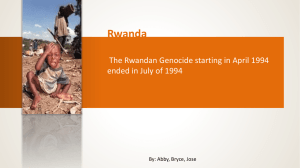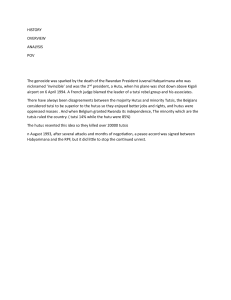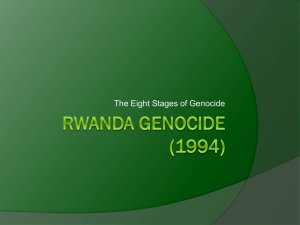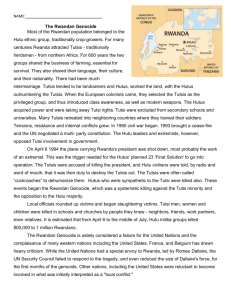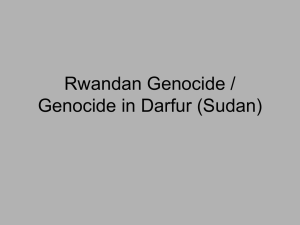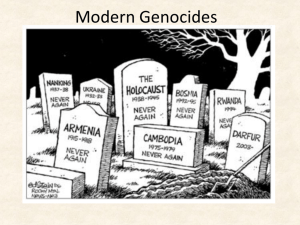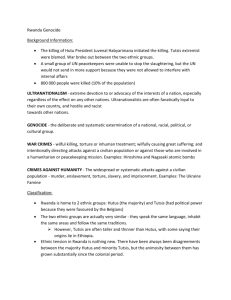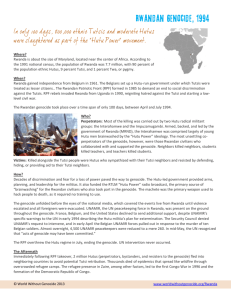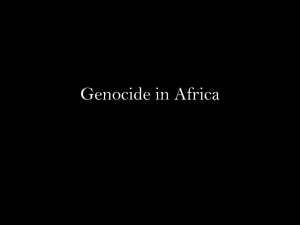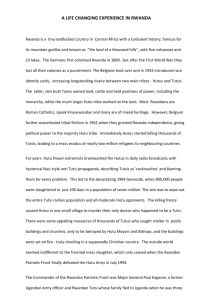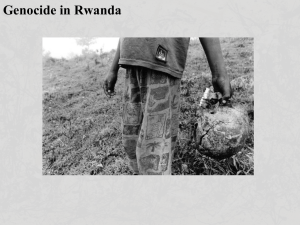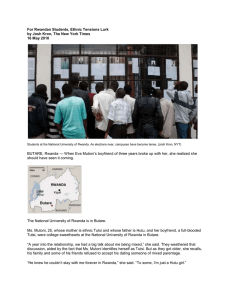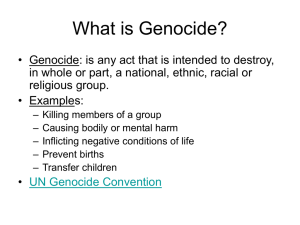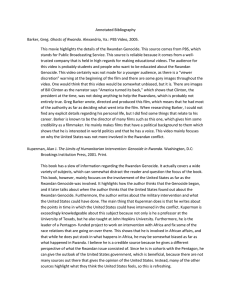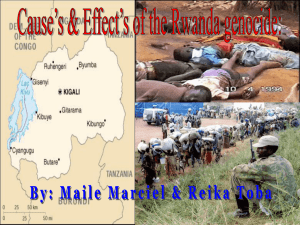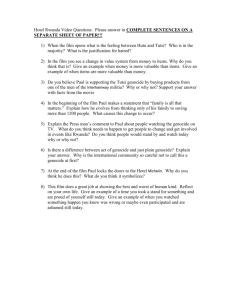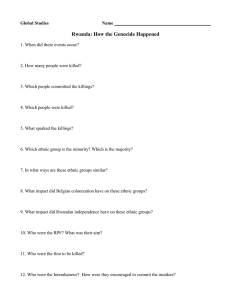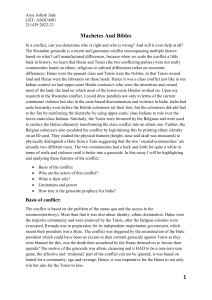Journalists jailed for inciting Rwandan genocide
advertisement
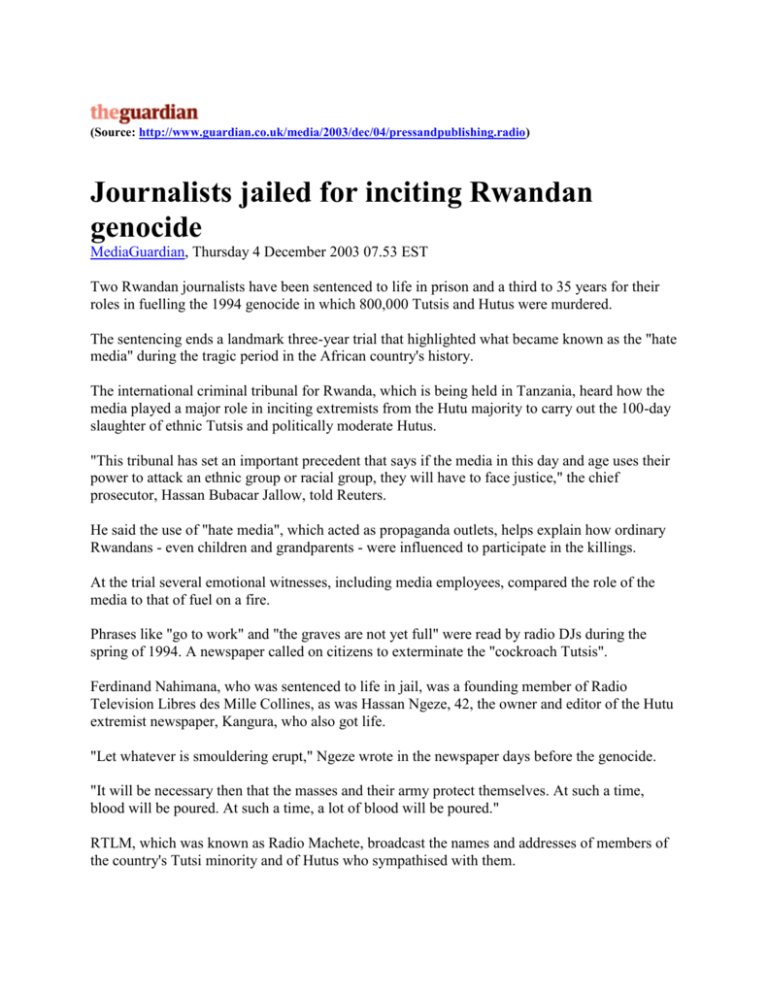
(Source: http://www.guardian.co.uk/media/2003/dec/04/pressandpublishing.radio) Journalists jailed for inciting Rwandan genocide MediaGuardian, Thursday 4 December 2003 07.53 EST Two Rwandan journalists have been sentenced to life in prison and a third to 35 years for their roles in fuelling the 1994 genocide in which 800,000 Tutsis and Hutus were murdered. The sentencing ends a landmark three-year trial that highlighted what became known as the "hate media" during the tragic period in the African country's history. The international criminal tribunal for Rwanda, which is being held in Tanzania, heard how the media played a major role in inciting extremists from the Hutu majority to carry out the 100-day slaughter of ethnic Tutsis and politically moderate Hutus. "This tribunal has set an important precedent that says if the media in this day and age uses their power to attack an ethnic group or racial group, they will have to face justice," the chief prosecutor, Hassan Bubacar Jallow, told Reuters. He said the use of "hate media", which acted as propaganda outlets, helps explain how ordinary Rwandans - even children and grandparents - were influenced to participate in the killings. At the trial several emotional witnesses, including media employees, compared the role of the media to that of fuel on a fire. Phrases like "go to work" and "the graves are not yet full" were read by radio DJs during the spring of 1994. A newspaper called on citizens to exterminate the "cockroach Tutsis". Ferdinand Nahimana, who was sentenced to life in jail, was a founding member of Radio Television Libres des Mille Collines, as was Hassan Ngeze, 42, the owner and editor of the Hutu extremist newspaper, Kangura, who also got life. "Let whatever is smouldering erupt," Ngeze wrote in the newspaper days before the genocide. "It will be necessary then that the masses and their army protect themselves. At such a time, blood will be poured. At such a time, a lot of blood will be poured." RTLM, which was known as Radio Machete, broadcast the names and addresses of members of the country's Tutsi minority and of Hutus who sympathised with them. "Nahimana chose a path of genocide and betrayed the trust placed in him as an intellectual and a leader. He caused the deaths of thousands of civilians without a firearm," said the presiding judge, Navanethem Pillay. Jean-Bosco Barayagwiza, a top executive at RTLM, who boycotted the trial, was given a 35-year sentence, which was reduced to 27 years for time already served. Their sentences follow the jailing of Belgian reporter Georges Ruggiu three years ago. He was jailed for 12 years in 2000 after pleading guilty to direct and public incitement to commit genocide. In testimony against the three sentenced yesterday, Ruggiu said: "The editorial policy of RTLM was to diabolise the RPF [the Tutsi dominated Rwandan Patriotic Front] and the pro-RPF personalities and to prove that UN peacekeepers deployed in the country were biased in favour of the RPF." The BBC's Ally Nugenzi, who worked as a journalist in Rwanda, said that during the massacre the radio station pinpointed targets. "RTLM acted as if it were giving instructions to the killers. It was giving directions on air as to where people were hiding," Nugenzi told the BBC's news website. The outcome drew comparisons with the 1946 Nuremberg trial of Nazi publisher Julius Streicher, who used films and cartoons to incite hatred of Jews and was executed for his role in the death of 6 million people. By soaking their journalism in ethnic hatred, the three men turned their media into weapons of war, the court said. Kangura, which means "wake it up", published what it called the "Hutu 10 Commandments" telling people to kill. John Floyd, the Washington-based lawyer who defended Ngeze, called the verdict unfair and said it curbed freedom of speech. Mr Floyd said it could be used as an excuse for politically charged governments to shut down any media outlet with which they disagreed. "The freedom of expression has stepped backward for 50 years," he told Reuters. "This would have never lasted in the US court. These men would have had their rights to democratic expression." The court said freedom came with responsibility.
